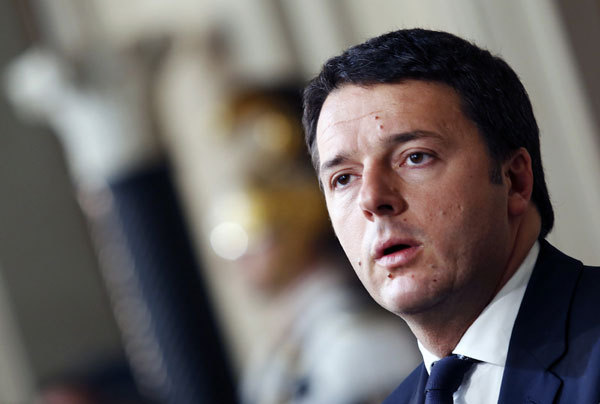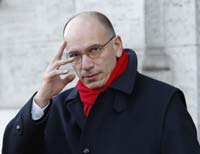 |
|
Italy's Prime Minister-designate Matteo Renzi talks to reporters after a meeting with President Giorgio Napolitano in Rome February 17, 2014. [Photo/Agencies] |
ROME -- Matteo Renzi, the leader of center-left Democratic Party (PD), on Monday was asked by Italian President Giorgio Napolitano to form a new government and introduce promised reforms to revive the crisis-plagued economy.
In his first words posted on a social network after receiving the mandate, Renzi assured Italy and Europe that he will keep faith with his commitment to accelerate introduction of much-needed change with all his "energy and strength."
 |
| Renzi set to become Italy's youngest PM |
 |
| Italian PM to resign after party withdraws support? |
According to the 39-year-old premier-designate, this month his government will make "some urgent work" on an election bill he negotiated with former Prime Minister Silvio Berlusconi. "Immediately afterward, there will be labor reforms in March, public-administration reforms in April and fiscal reforms in May," Renzi said in a brief press conference.
The current mayor of Florence said he aimed at the new government to last until the end of the parliamentary term in 2018 to better relaunch Italy after its longest recession in 40 years and to curb record high unemployment that has surpassed 40 percent among youth.
Consultations with political parties on the cabinet makeup will start early on Tuesday and would last a few days, Renzi said.
In order to secure a majority in parliament and be able to govern the country, Renzi first of all needs to find support from the New Center Right (NCD) party. The NCD was part of the outgoing left-right government led by Enrico Letta after the group split from Berlusconi's Forza Italia (FI) last year.
If negotiations succeed, Renzi would be sworn in as Italy's youngest ever prime minister as well as the third straight unelected prime minister in the country since the end of 2011.
Renzi has never been elected to parliament and never served in a national government, which observers saw both as a sign of hope in Italy's politics marked by decades of scandals and a big question mark given the fragility of the unnatural coalition.
"At 39, Renzi has the responsibility to lead the country in this difficult situation," the director of la Repubblica newspaper Ezio Mauro said commenting on the appointment. At the same time, Mauro underlined, "Renzi wanted to reach this point without heeding the danger, on an unconventional path that created him some problems with the public opinion."
The rapidity of Renzi's ascent since he was elected provincial president in 2004 in his hometown Florence was very surprising in a country characterized by record slow political turnover.
Last week Renzi called a meeting of the PD leadership to oust Letta, the previous prime minister, after blaming his government for ineffective pace in dealing with the economic crisis. The overwhelming majority of party members voted for change, forcing Letta to resign after only 10 months of government.
Luca Ricolfi, a political commentator for La Stampa newspaper, noted "history's judgment on leaders depends almost never on the more or less perfunctory means that they used to gain power but instead on the use they made of power."
Should Renzi fail in his bid to bring some change, many may blame him for "betraying his party fellow" Ricolfi said. If he is successful, however, "those who today are outraged will eventually forgive him too," he added.
Italians are divided on whether Renzi will be able to carry out the reforms. A survey released last Friday said that 48 percent of respondents were confident but 44 percent were skeptical.
|
|
|
|
|
|
|
|
